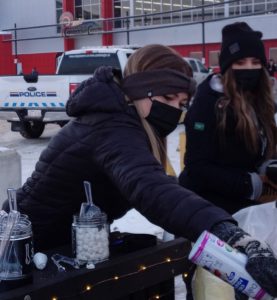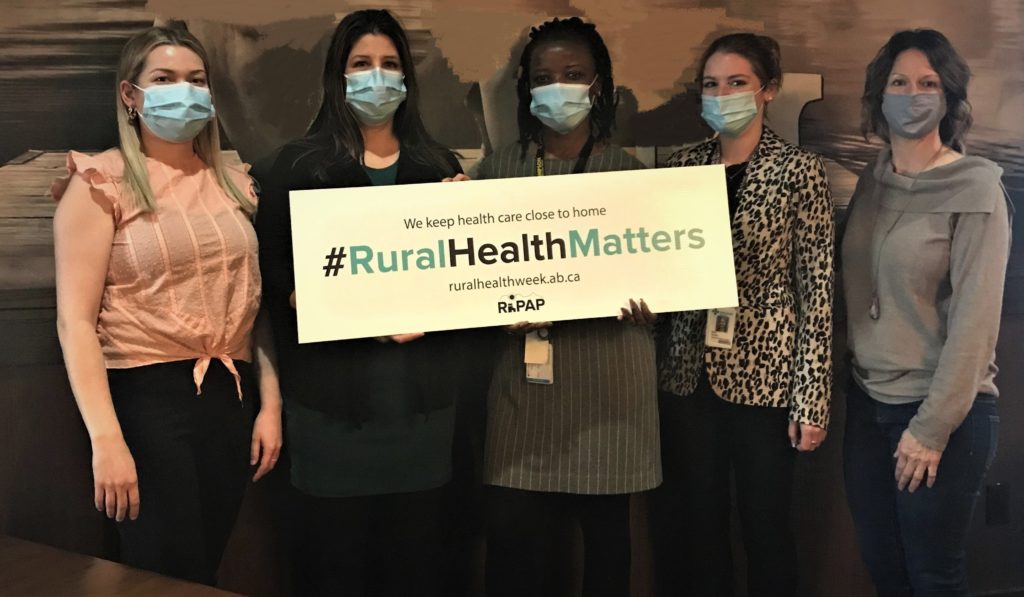Cheering on Junior A hockey, practising self-care, and stepping up to volunteer may not be activities you would expect a university student to focus on during a social work practicum in rural Alberta.
However, it’s exactly how Kristyn Nelson spent some of her time in Bonnyville during the final three months of her University of Calgary Bachelor of Social Work degree program where she applied her learning.
For Nelson, working as a mental health therapist was an ideal placement, and one that landed her a social worker position with Alberta Health Services in the region starting in May.
Nelson was one of seven social work students participating in a pilot project involving the University of Calgary, AHS, and RhPAP who were placed in Bonnyville, Cold Lake, and the Regional Municipality of Wood Buffalo.

Pictured at the wrap-up lunch from back left: Rosilita Jn-Pierre, manager of addictions and mental health; Roseline Onuch, student supervisor in-patient unit; Emily Ann Goobie, student; Tara Wickens, student; Amy Parsons, supervisor; Andrea Elliott, supervisor with addictions and mental health; Geneve Berkenkamp, student; and Jennifer Best, RhPAP rural consultant.
— Photo supplied by Jennifer Best, RhPAP
“[People here] were excited for me to shadow them and [encouraged] my [input] on their sessions as well… [Recognizing] that I knew no one here, they kind of took care of me as one of their own. It’s been really rewarding.”
Nelson, who has lived in Lethbridge for 28 years, wanted to explore as much as she could during her practium in rural Alberta to make it worthwhile.
Along the way, she learned immersing herself in her work is important, but so is taking time for herself.
“In order to last in my career, health care is a huge piece of that,” said Nelson. “When I first came, I was doing really well with self-care and doing meal planning prep on Sundays and trying to release [stress] everyday was big.”
Nelson learned from her experience that balance is key.

— Photo supplied by Kristyn Nelson
“I’ve been trying to take advantage of every single opportunity that’s given to me. In theory, it’s not realistic to always be a ‘yes’ person and … take on everything,” Nelson explained.
“It’s really important to also have those boundaries and know yourself [and] what your limits are, so that you can continue to work and be healthy and not burnout.”
RhPAP helped ensure that the placements weren’t all work. It supported opportunities for the students to play by offering vouchers to local amenities such as gyms and coffee shops as well as recommending other local community gems.
“Community promotion is a strategy that can yield great rewards in encouraging students to work in rural Alberta,” said RhPAP consultant Anita Fagnan.
“A first impression leaves a lasting impression, so why not make it a good one,” added Fagnan.
“Trying new experiences and putting themselves out there can help students know if the job and also the community would be a good fit for them. Connection and fun are key ingredients to providing people with a positive experience that will make for lasting memories and friendships.”
“Studies show that people stay in rural more for the lifestyle than for the actual work that they do. This does not minimize the value of meaningful employment, but it demonstrates the importance of including the living and playing part [when introducing new people to the community]”
– Jennifer Best, RhPAP Rural Community Consultant.
While RhPAP doesn’t recruit health professionals, the organization works with local attraction and retention committees to showcase the value of working in rural Alberta, noted Jennifer Best, Fagnan’s colleague and rural consultant for the Wood Buffalo region.
“Studies show that people stay in rural more for the lifestyle than for the actual work that they do. This does not minimize the value of meaningful employment, but it demonstrates the importance of including the living and playing part [when introducing new people to the community],” said Best.
Another student, Geneve Berkenkamp, also hopes to kick off her career in a rural setting. The sense of community, along with an ability to experience nature, has drawn her to rural social work.
“I like the small-town feel and how it’s a little less busy,” said Berkenkamp, who completed her practicum in Fort McMurray shadowing the mental health and addictions teams, and participating in direct client work.
After spending much of her degree studying online in Calgary, having the opportunity to work with clients in person—especially those in Indigenous communities—was worthwhile and eye-opening.
“That was really beneficial to broaden my knowledge,” said Berkenkamp, who spent some time south of Fort McMurray in Conklin and Janvier.
While she had worked with Indigenous clients previously in urban clinics, meeting them directly in their home environment gave her greater understanding of the supports that might be of benefit.

— Photo supplied by Anita Fagnan
Back in Bonnyville, Nelson’s mentor Kristine Crossland, a mental health therapist at Bonnyville Mental Health, said offering a welcoming atmosphere for practicum students goes a long way in encouraging them to stay.
She noted that Nelson worked hard to develop community roots through her interactions on and off the job.
“She put the work in, she made some great friendships, and did some great volunteering. From a recruitment standpoint, it was fantastic,” said Crossland.
“For us who are here to recruit, [hiring] is the hope when you have practicum students.”
— Lorena Franchuk
